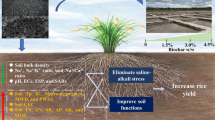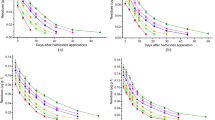Abstract
We evaluated the agronomic quality of loam to clay–loam soils from a Mediterranean area, which have been submitted for more than 10 years to irregular and poorly controlled treated wastewater (TWW) irrigation and sewage sludge (SS) amendment, both TWW and SS issuing from a domestic effluent treatment plant. A soil was submitted to SS amendment only, another to TWW irrigation only, another to both treatments, and another was not submitted to any of these treatments. We found that the agronomic quality of the treated soils has not decreased. In treated soils, it was observed a slight increase of pH, an increase of the cation exchange capacity, and no change of either salinity or electrical conductivity. Sodium adsorption ratio and exchangeable sodium percentage remained satisfactory, below 13 and 15, respectively, and no infiltration problems were observed, indicating that rainwater percolation was sufficient to leach the salt brought by SS or TWW. The soil organic matter (SOM) increased in all SS-amended and/or TWW-irrigated soils, the increase being higher in SS-amended soils. The SOM kept a satisfactory C/N ratio, lower than 15; the SUVA (Specific UV Absorbance) and E2/E3 index showed normal characteristics of the water-extracted organic matter (WEOC). Both SS amendment and TWW irrigation brought high amounts of nutrients in the considered soils and increased the nutrients disponibility, especially regarding K and P, as shown by the nutrient concentrations in the soil water extracts. The pH increase does not seem to be a problem for the bioavailability of trace elements, at least regarding Cu, Zn, Co, and Fe. Complementary studies should be undertaken for Ni. These observations highlight the potential agronomical benefits of application of wastewater and sewage sludge, even without great technicality, the better results being obtained using both SS amendment and TWW irrigation.





Similar content being viewed by others
References
Abedie-Koupai J, Mostafazadeh-Fard B, Afyuni M, Bagheri MR (2006) Effect of treated wastewater on soil chemical and physical properties in an arid region. Plant Soil Environ 52:335–344. https://doi.org/10.17221/3450-PSE
Ahmed HK, Fawy HA, Abdel-Hady ES (2010) Study of sewage sludge use in agriculture and its effect on plant and soil. Agric Biol J N Am 1:1044–1049. https://doi.org/10.5251/abjna.2010.1.5.1044.1049
Angers DA, Chantigny MH, Rochette P, Gagon B (2006) Dynamics of soil water-extractable organic C following application of dairy cattle manures. Can J Soil Sci 86:851–858. https://doi.org/10.4141/S05-092
Barton L, Schipper LA (2005) Land application of domestic effluent onto four soil types: plant uptake and nutrient leaching. J Environ Qual 34:635–643. https://doi.org/10.2134/jeq2005.0635
Belaid N, Catherine N, Monem K, Tarek A, Abdelmoneim A, Michel B (2012) Long term effects of treated wastewater irrigation on calcisol fertility: a case study of Sfax-Tunisia. Agric Sci 3:702–713. https://doi.org/10.4236/as.2012.35085
Benmouffouk A (1994) Caractérisation et valorisation agricole des boues résiduaires de Draa Ben Khedda (Algérie). Cah Agric 3:295–299 http://revues.cirad.fr/index.php/cahiers-agricultures/article/view/29849/29609
Brallier S, Harrison RB, Henry CL, Dongsen X (1996) Liming effects on availability of Cd, Cu, Ni and Zn in a soil amended with sewage sludge 16 years previously. Water Air Soil Pollut 86:195–206. https://doi.org/10.1007/BF00279156
Chantigny MH (2003) Dissolved and water-extractable organic matter in soils: a review on the influence of land use and management practices. Geoderma 113:357–380. https://doi.org/10.1016/S0016-7061(02)00370-1
Ćirić V, Belić M, Nešić L, Šeremešić S, Pejić B, Bezdan A, Manojlović M (2016) The sensitivity of water extractable soil organic carbon fractions to land use in three soil types. Arch Agron Soil Sci 62:1654–1664. https://doi.org/10.1080/03650340.2016.1165345
Clapp CE, Stark SA, Clay DE, Larson WE (1986) Sewage sludge organic matter and soil properties. Dev Plant Soil Sci 25:209–253. https://doi.org/10.1007/978-94-009-4426-8_10
de Souza ER, de Melo HF, de Almeida BG, de Melo DVM (2013) Comparação de métodos de extração da solução do solo. Rev Bras Eng Agri Ambiental 17:510–517 http://www.agriambi.com.br/revista/v17n05/v17n05a07.pdf
Delibacak A, Okur EA, Ogun R (2009) Influence of treated sewage sludge applications on temporal variations of plant nutrients and heavy metals in a typical Xerofluvent soil. Nutr Cycl Agroecosyst 83:249–257. https://doi.org/10.1007/s10705-008-9215-x
Elifantz H, Kautsky L, Mor-Yosef M, Tarchitzky J, Bar-Tal A, Chen YN, Minz D (2011) Microbial activity and organic matter dynamics during 4 years of irrigation with treated wastewater. Microb Ecol 62:973–981. https://doi.org/10.1007/s00248-011-9867-y
Fantappiè M, L'Abate G, Costantini EAC (2011) The influence of climate change on the soil organic carbon content in Italy from 1961 to 2008. Geomorph 135:343–352. https://doi.org/10.1016/j.geomorph.2011.02.006
Fernández JM, Plaza C, Hernández D, Polo A (2007) Carbon mineralization in an arid soil amended with thermally-dried and composted sewage sludges. Geoderma 137:497–503. https://doi.org/10.1016/j.geoderma.2006.10.013
Fipps G (1996) Irrigation water quality standards and salinity management strategies. Texas Agricultural Extension Service B-1667, Texas A&M University System, College Station
Fytili D, Zabaniotou A (2008) Utilization of sewage sludge in EU application of old and new methods—a review. Renew Sustain Energ Rev 12:116–140. https://doi.org/10.1016/j.rser.2006.05.014
Gerzabek MH, Haberhauer G, Kirchmann H (2001) Soil organic matter pools and carbon-13 natural abundances in particle-size fractions of a long-term agricultural field experiment receiving organic amendments. Soil Sci Soc Am J 65:352–358. https://doi.org/10.2136/sssaj2001.652352x
Guigue J, Lévèque J, Mathieu O, Schmitt-Kopplin P, Lucio M, Arrouays D, Jolivet C, Dequiedt S, Chemidlin Prévost-Bouré N, Ranjard L (2015) Water-extractable organic matter linked to soil physico-chemistry and microbiology at the regional scale. Soil Biol Biochem 84:158–167. https://doi.org/10.1016/j.soilbio.2015.02.016
Halliwell DJ, Barlow KM, Nash DM (2001) A review of the effects of wastewater sodium on soil physical properties and their implications for irrigation systems. Aust J Soil Res 39:1259–1267. https://doi.org/10.1071/SR00047
Hannachi A, Gharzouli R, Djellouli Tabet Y (2014) Gestion et valorisation des eaux usées en Algérie. Larhyss J 19:51–62
Hassouna M, Massiani C, Dudal Y, Pech N, Theraulaz F (2010) Changes in water extractable organic matter (WEOM) in a calcareous soil under field conditions with time and soil depth. Geoderma 155:75–85. https://doi.org/10.1016/j.geoderma.2009.11.026
Haynes RJ, Naidu R (1998) Influence of lime, fertilizer and manure applications on soil organic matter content and soil physical conditions: a review. Nutr Cycl Agroecosyst 51:123–137. https://doi.org/10.1023/A:1009738307837
He Y, DeSutter TM, Hopkins DG, Wysocki DA, Clay DE (2015) Relationship between 1:5 soil/water and saturated paste extract sodium adsorption ratios by three extraction methods. Soil Sci Soc Am J 79:681–687. https://doi.org/10.2136/sssaj2014.09.0384
Hinsinger P (1998) How do plant roots acquire mineral nutrients? Chemical processes involved in the rhizosphere. Adv Agron 64:225–265. https://doi.org/10.1016/S0065-2113(08)60506-4
Hussain I, Raschid L, Hanjra MA, Marikar F, van der Hoek W (2002) Wastewater use in agriculture: review of impacts and methodological issues in valuing impacts. Working Paper 37, International Water Management Institute, Colombo
Igoud S (2001) Valorisation des Boues Résiduaires Issues des Stations d’Epuration Urbaines par leur Epandage dans les Plantations Forestières. Rev Energ Ren : Production et Valorisation—Biomasse, p 69–74
Jolliffe IT (2002) Principal component analysis, 2nd edn. Springer-Verlag, New York
Jones JB (2012) Plant nutrition and soil fertility manual, 2nd edn. CRC Press, Boca Raton
Kabata-Pendias A, Pendias H (2001) Trace elements in soils and plants, 3rd edn. CRC Press, Boca Raton
Kraemer SM, Crowley DE, Kretzschmar R (2006) Geochemical aspect of phytosiderophore-promoted iron acquisition by plants. Adv Agron 91:1–46. https://doi.org/10.1016/S0065-2113(06)91001-3
Laird DA (2008) The charcoal vision: a win–win–win scenario for simultaneously producing bioenergy, permanently sequestering carbon, while improving soil and water quality. Agron J 100:178–181. https://doi.org/10.2134/agronj2007.0161
Lamond R, Whitney DA (1992) Management of saline and sodic soils. Department of Agronomy MF-1022. Kansas State University, Mahattan
Lehmann J, da Silva JP Jr, Steiner C, Nehls T, Zech W, Glaser B (2003) Nutrient availability and leaching in an archaeological Anthrosol and a Ferralsol of the Central Amazon basin: fertilizer, manure and charcoal amendments. Plant Soil 249:343–357. https://doi.org/10.1023/A:1022833116184
Michael-Kordatou I, Michael C, Duan X, He X, Dionysiou DD, Mills MA, Fatta-Kassinos D (2015) Dissolved effluent organic matter: characteristics and potential implications in wastewater treatment and reuse applications. Water Res 77:213–248. https://doi.org/10.1016/j.watres.2015.03.011
Mtshali JS, Tiruneh AT, Fadiran AO (2014) Characterization of sewage sludge generated from wastewater treatment plants in Swaziland in relation to agricultural uses. Resour Environ 4:190–199. https://doi.org/10.5923/j.re.20140404.02
Odlare M, Arthurson V, Pell M, Svensson K, Nehrenheim E, Abubaker J (2011) Land application of organic waste – Effects on the soil ecosystem. Appl Energy 88:2210–2218
Pastor L, Cathalot C, Deflandre B, Viollier E, Soetaert K, Meysman FJR, Ulses C, Metzger E, Rabouille C (2011) Modeling biogeochemical processes in sediments from the Rhône River prodelta area (NW Mediterranean Sea). Biogeosciences 8:1351–1366. https://doi.org/10.5194/bg-8-1351-2011
Pedrero F, Kalavrouziotis I, Alarcón JJ, Koukoulakis P, Asano T (2010) Use of treated municipal wastewater in irrigated agriculture—review of some practices in Spain and Greece. Agric Water Manag 97:1233–1241. https://doi.org/10.1016/j.agwat.2010.03.003
Pereira LS, Oweis T, Zairi A (2002) Irrigation management under water scarcity. Agric Water Manag 57:175–206. https://doi.org/10.1016/S0378-3774(02)00075-6
Peuravuori J, Pihlaja K (1997) Molecular size distribution and spectroscopic properties of aquatic humic substances. Anal Chim Acta 337:133–149. https://doi.org/10.1016/S0003-2670(96)00412-6
Qadir M, Wichelns D, Raschid-Sally L, McCornick PG, Drechsel P, Bahri A, Minhas PS (2010) The challenges of wastewater irrigation in developing countries. Agric Water Manag 97:561–568. https://doi.org/10.1016/j.agwat.2008.11.004
Ramdani N, Hamou A, Lousdad A, Al-Douri Y (2015) Physicochemical characterization of sewage sludge and green waste for agricultural utilization. Environ Technol 36:1594–1604. https://doi.org/10.1080/09593330.2014.998716
Rehman K, Ashraf S, Rashid U, Ibrahim M, Hina S, Iftikhar T, Ramzan S (2013) Comparison of proximate and heavy metal contents of vegetables grown with fresh and wastewater. Pak J Bot 45:391–400
Roca-Pérez L, Martínez C, Marcilla P, Boluda R (2009) Composting rice straw with sewage sludge and compost effects on the soil–plant system. Chemosphere 76:781–787. https://doi.org/10.1016/j.chemosphere.2008.12.058
Sahnoun AY, Tidjani AEB, Iddou A (2012) Comparative study of the characteristics of three types of sludge from wastewater treatment plant. Energy Procedia 18:99–109. https://doi.org/10.1016/j.egypro.2012.05.022
Singh RP, Agrawal M (2008) Potential benefits and risks of land application of sewage sludge. Waste Manag 28:347–358. https://doi.org/10.1016/j.wasman.2006.12.010
Stevens DP, McLaughlin MJ, Smart MK (2003) Effects of long-term irrigation with reclaimed water on soils of the Northern Adelaide Plains, South Australia. Austr J Soil Res 41:933–948. https://doi.org/10.1071/SR02049
Tarchouna LG, Merdy P, Raynaud M, Pfeifer HR, Lucas Y (2010) Effects of long-term irrigation with treated wastewater part I: evolution of soil physico-chemical properties. Appl Geochem 25:1703–1710. https://doi.org/10.1016/j.apgeochem.2010.08.018
Triberti L, Nastri A, Baldoni G (2016) Long-term effects of crop rotation, manure and mineral fertilisation on carbon sequestration and soil fertility. Eur J Agron 74:47–55. https://doi.org/10.1016/j.eja.2015.11.024
US Salinity Lab Staff (1954) Diagnosis and improvement of saline and alkali soils. USDA handbook 60. Government Printing Office, Washington DC
USDA (1993) Soil survey manual Soil Conservation Service. USDA Handbook 18. Government Printing Office, Washington DC
Warman PR, Termeer WC (2005) Evaluation of sewage sludge, septic waste and sludge compost applications to corn and forage: yields, and N, P and K content of crops and soils. Bioresour Technol 96:955–961. https://doi.org/10.1016/j.biortech.2004.08.003
Weishaar JL, Aiken GR, Bergamaschi BA, Fram MS, Fujii R, Mopper K (2003) Evaluation of specific ultraviolet absorbance as an indicator of the chemical composition and reactivity of dissolved organic carbon. Env Sci Technol 37:4702–4708. https://doi.org/10.1021/es030360x
Xing M, Li X, Yang J, Huang Z, Lu Y (2012) Changes in the chemical characteristics of water-extracted organic matter from vermicomposting of sewage sludge and cow dung. J Hazard Mat 205-206:24–31. https://doi.org/10.1016/j.jhazmat.2011.11.070
Zebarth BJ, McDougall R, Neilsen G, Neilsen D (2000) Availability of nitrogen from municipal sewage sludge for dryland forage grass. Can J Plant Sci 80:575–582. https://doi.org/10.1016/j.jhazmat.2011.11.070
Zeng G, Wu H, Liang J, Guo S, Huang L, Xu P, Liu Y, Yuan Y, He X, He Y (2015) Efficiency of biochar and compost (or composting) combined amendments for reducing Cd, Cu, Zn and Pb bioavailability, mobility and ecological risk in wetland soil. RSCAdv 5:34541–34548. https://doi.org/10.1039/C5RA04834F
Zsolnay A (2003) Dissolved organic matter: artefacts, definitions, and functions. Geoderma 113:187–209. https://doi.org/10.1016/S0016-7061(02)00361-0
Acknowledgments
We thank the Algerian Ministry of High Education and Scientific Research (MESRS) and the Mouloud Mammeri University for the doctoral scholarship and facilities that allowed this work.
Author information
Authors and Affiliations
Corresponding author
Additional information
Responsible editor: Zhihong Xu
Rights and permissions
About this article
Cite this article
Cherfouh, R., Lucas, Y., Derridj, A. et al. Long-term, low technicality sewage sludge amendment and irrigation with treated wastewater under Mediterranean climate: impact on agronomical soil quality. Environ Sci Pollut Res 25, 35571–35581 (2018). https://doi.org/10.1007/s11356-018-3463-3
Received:
Accepted:
Published:
Issue Date:
DOI: https://doi.org/10.1007/s11356-018-3463-3




